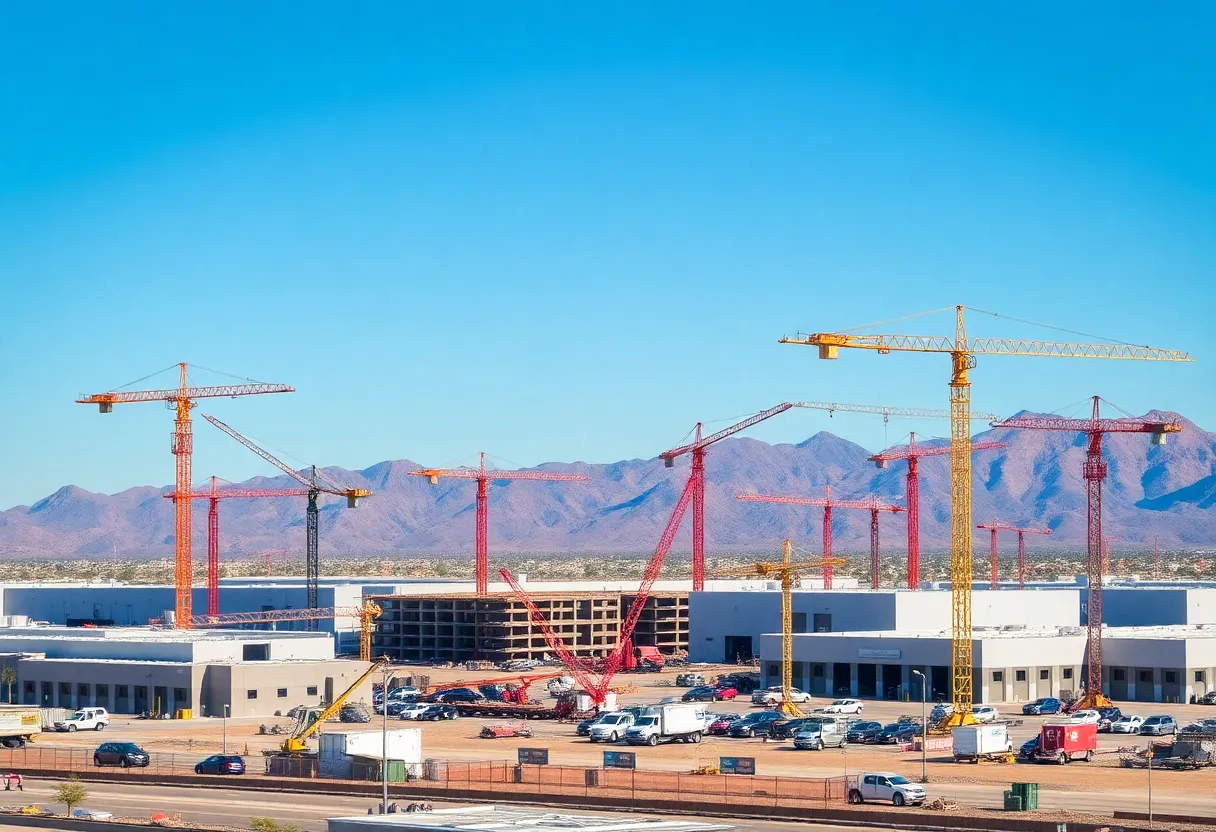News Summary
Phoenix is witnessing a slowdown in industrial construction activity as 2025 begins, yet the city boasts a substantial development pipeline of 11.9 million square feet of industrial space. A recent analysis shows a decline in the development pipeline, but ongoing construction reflects robust demand. Key projects like the Meta Mesa Data Center indicate continued investment interest, although labor shortages and supply chain issues challenge growth. The region’s industrial market remains noteworthy, attracting significant investment despite fluctuating conditions.
Phoenix is experiencing a slowdown in industrial construction activity as the year 2025 begins, yet the city retains a robust development pipeline totaling 11.9 million square feet of industrial space. This data comes from a recent analysis by Kidder Mathews, which highlights the fluctuating conditions of the Phoenix industrial market.
As the development pipeline for industrial projects decreased dramatically from 42.5 million square feet to 22.4 million square feet by the end of December 2024, the ongoing shifts in the market have resulted in a maintained vacancy rate of 8.4%—an increase of 500 basis points year-over-year, largely attributed to excess supply. This indicates that while construction is slowing, there is still significant space in planning stages ready to meet future demand.
During 2024, Phoenix’s industrial investment volume reached approximately $3.2 billion, further showcasing the region’s allure despite ongoing market fluctuations. This makes Phoenix a leader in industrial sales volume within the greater region, with deals totaling approximately $3.4 billion and 226 properties having changed hands, comprising approximately 21.5 million square feet of space.
Current Construction Activity
In January 2025, the industrial sector in Phoenix had around 15 million square feet under construction spread across 76 properties. This figure is more than double the 7.3 million square feet reported in the same period the previous year, illustrating that while overall construction activity has slowed, a substantial amount of space is still being developed. Among the largest projects is the Meta Mesa Data Center – Building 3, which will feature 1.5 million square feet and is slated to open in early 2026.
Market Comparisons
The Phoenix industrial market is substantial in scale; the remaining pipeline constitutes 3.5% of the total stock, significantly outperforming the national average of 1.7%. Peer markets such as Chicago, New Jersey, and Atlanta have also seen their respective pipelines, but none boast the same level of ongoing construction as Phoenix, which had 36 million square feet of industrial space come online last year—a figure that accounts for 8.5% of the total stock, surpassing the national average of 1.9%.
Factors Influencing Construction
The slowdown in construction activity is attributable to various factors, including persistent challenges related to labor shortages and ongoing global supply chain disruptions. Despite these obstacles, there are indications of stabilization regarding material costs and renewed economic confidence, which may contribute positively to future construction efforts.
Recent Developments and Trends
Noteworthy developments include Amazon’s significant lease of a newly built 1.2 million-square-foot facility at The Cubes at Glendale, which reflects the demand for such spaces in the area. Similarly, GTI Fabrication announced the expansion of its energy storage business in the Phoenix market by leasing a 530,307-square-foot facility in Goodyear, indicative of the increasing demand for modern industrial infrastructures.
As of January 2025, the vacancy rate in Phoenix has seen a slight decrease to 7.9%. This change reflects the market’s ongoing adjustments and the potential for future growth as companies like Amazon continue to expand their presence in the region.
Conclusion
The Greater Phoenix commercial real estate market illustrates both resilience in the face of economic challenges and a strong capacity for future growth. As the city adapts to shifting demands, its industrial market remains a critical area of focus for investors, businesses, and developers looking to capitalize on the evolving landscape.
Deeper Dive: News & Info About This Topic
HERE Resources
Hadrian Invests $200 Million in New AI-Powered Facility in Mesa
Shopoff Realty Secures $52 Million for Mesa Industrial Project
Provident Industrial Expands to Phoenix with New Office
Phoenix’s Commercial Real Estate Market Transformation
Arizona to Host $1 Trillion AI Manufacturing Complex
Mortenson Co. Acquires 217 Acres in Northeast Phoenix
Poppee’s Popcorn Acquired by Lehi Valley Trading Company
SoftBank Proposes $1 Trillion AI and Robotics Hub in Arizona
Legal Battle Over Low-THC Hemp Products in Arizona
Tempe City Council Proposes Zoning Changes for Data Centers
Additional Resources
- AZ Big Media: Phoenix Industrial Pipeline Remains Robust Despite Slowdown
- Colliers: Phoenix Posts Record Year for Industrial Deliveries
- Commercial Search: Phoenix Maintained Industrial Strength in 2024
- KTAR: Construction of 1st Phase Industrial
- AZ Big Media: Phoenix Maintains Momentum as Nation’s No. 1 Industrial Market
- Wikipedia: Phoenix, Arizona
- Google Search: Phoenix Industrial Real Estate
- Encyclopedia Britannica: Phoenix
- Google Scholar: Phoenix Industrial Real Estate
- Google News: Phoenix Industrial Construction

Author: STAFF HERE PHOENIX WRITER
The PHOENIX STAFF WRITER represents the experienced team at HEREPhoenix.com, your go-to source for actionable local news and information in Phoenix, Maricopa County, and beyond. Specializing in "news you can use," we cover essential topics like product reviews for personal and business needs, local business directories, politics, real estate trends, neighborhood insights, and state news affecting the area—with deep expertise drawn from years of dedicated reporting and strong community input, including local press releases and business updates. We deliver top reporting on high-value events such as the Waste Management Phoenix Open, Cactus League Spring Training, and Arizona State Fair. Our coverage extends to key organizations like the Greater Phoenix Chamber of Commerce and Visit Phoenix, plus leading businesses in technology and healthcare that power the local economy such as Intel and Banner Health. As part of the broader HERE network, including HERETucson.com, we provide comprehensive, credible insights into Arizona's dynamic landscape.






